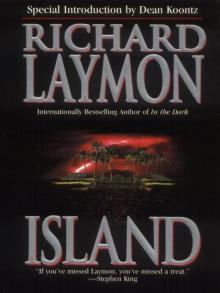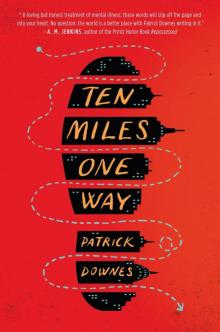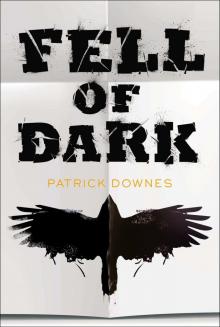- Home
- Patrick Downes
Island Page 5
Island Read online
Page 5
We didn’t talk the next day. Or the day after. Or anytime soon.
Jacqui and I fell back into our silence, and I went back to looking at her. Though she started, I think, looking back at me.
Maybe two weeks went by until Jacqui caught up to me after school. She had and has more courage than I will ever possess.
“How’s your hand?”
Silence.
“You really, really don’t like talking, do you?”
I shrugged.
“I bet I can get you to say more than two words.”
“You’d lose.”
Pause. You know, to let it sink in.
“Oh,” she smiled. “Funny. Is your hand all right?”
I rubbed my hand. “It’s fine,” I said.
“Rad?”
I waited.
“Rad?”
“Present.”
“Wow. Again with the funny.”
“Not really.”
“Rad?”
“Jacqui?” I had never said her name, and it felt sticky and sweet on my lips, like cotton candy.
“Rad, I’ve spent some time thinking about this. I think we should be friends.”
Silence. I was tasting her name, the taste of blue.
“What do you think? Interested?”
“Why?”
“Why what?”
“Why do you want to be friends with me?”
Jacqui rocked back and forth on her feet. “Don’t be stupid,” she said.
“That’s hard for me,” I said.
I walked her home. Jacqui talked, and I listened. Month after month, through the rest of eighth grade, the next summer, and all the way through ninth grade, I walked Jacqui home after school, and then walked the two miles back to my house. And I left my house early every morning to walk the two miles to Jacqui’s to walk her to school. I didn’t have the money to do anything with her, or nothing more than buy a soda, maybe a slice of pizza, as we walked. I walked her between home and school twice a day, every day, and we talked. We laughed. It all went great. Beautiful. We were friends.
We were friends.
Nothing ever happened. I’m not entirely sure why.
We loved each other, but somehow we couldn’t ever touch each other. We didn’t hug. We didn’t hold hands. We had this unspoken understanding that we wouldn’t try. As if there was some kind of barrier, a force field, an invisible fence, something that would repel our hands, give us a painful shock if we attempted it.
Honestly, I think we wanted each other so much we couldn’t imagine what would happen to us if we tried to make it real. I think we both thought we would die. Like a mortal taking in a god — theophany — which almost never goes well for the mortal.
We laughed. We talked. We didn’t touch each other.
We were best friends.
Until we weren’t.
* * *
ı
The summer between ninth and tenth grade, Jacqui went to, of all things, a sleep-away debate camp. Seriously. She researched and argued every day, morning, noon, and night for an entire month of summer. Does that even make sense? We sent each other letters — for some reason, campers weren’t allowed to use e-mail — and we talked on the phone ten, fifteen times over the first week.
Then, silence.
The letters from Jacqui stopped. The phone calls stopped. Nothing.
Emptiness.
The silence drove me wild with worry, anger, desire. I went into some kind of chemical withdrawal, and I could barely stand up for all the pain in my body. Maybe you know what I mean. Fullness, then emptiness, then sickness.
For nine days I was nothing but a vicious storm at home. Key couldn’t speak to me, look at me. He was more like the National Guard than my brother, the militia protecting the citizenry and their property from my weather, trying to work against the wind and rain and flooding.
But the storm was indoors and out, and there was nowhere for Key to hide.
And then Jacqui called. Jacqui called, and for a moment all the weather lifted.
Jacqui called, and with that call everything ended. My weather and my heart. Ended for real.
An island in the making.
“So, Rad,” Jacqui said. “There’s this guy.”
That’s all she needed to say. But I was her best friend, so I clenched my fists and my teeth, fought the desire to throw up, or hang myself, or reach through the phone, and I said, “Does this guy have a name?”
“It doesn’t matter.”
This landed between us, and I knew the whole story. That one sentence, “It doesn’t matter,” sat there between us, like a severed head in a sack. Know what I mean? A murder had occurred, a crime, something ugly and terrible, and there wasn’t anything we could do about it. No going back. I mean, we had this head between us, and someone had to pick it up.
“Why?”
“Why what, Rad?”
“Why doesn’t it matter?”
This time Jacqui didn’t have the words.
Silence. Then I erupted.
“Why didn’t you call me, Jacqui? I’m your best friend. Why didn’t you call me? I would have talked you out of it. I would have talked you out of him, out of doing what you did, out of everything. I would’ve stopped you. I could’ve stopped you.”
“That’s why I didn’t call.”
Jacqui had hit me with a hammer. My best friend. A hammer. I shook my head to come to my senses.
“What do you mean?” I think I growled it, sneered it.
“I didn’t want you to talk me out of anything.”
“I can’t believe this. How could you have done this to yourself? How could you have done this to me? Didn’t you miss me at all? How could sleeping with whatever-his-name-is have ever seemed like the right thing? You’re fifteen. We’re fifteen. And we —”
I couldn’t say it.
“We what, Rad?”
“Nothing. Nothing, nothing, nothing.”
She heard me punch the chest of drawers in my room.
“Rad? What did you hit?”
I punched the furniture again.
“Rad, stop.”
Again, again. Punching.
I hung up.
I hung up, and I thought, I’m done.
The wildness, that wildness was different from all the other wildness because love was attached to it. A girl was attached to it. Rejection, jealousy, confusion, helplessness, envy, anger, and sadness.
I was drunk. I wanted to die. So I went to the kitchen.
I wanted a knife. I wanted to stab myself a hundred times, be done with it, with everything. I went to the kitchen. Nine-thirty at night. I wanted the biggest knife I could find, but what I found in the kitchen was —
My father, standing over the kitchen sink. His shoulders hunched. He was alone, staring into the sink. Who knows why?
My father stood between me and the block of old knives barely sharp enough to break the skin. They would work, though. They were still knives. My father stood between me and death, a death I wanted more than anything else.
“Move,” I said, and I shoved him.
My father hadn’t really been my father for years. He had given up, and then his wife died, and he did nothing but wait for all his money to run out — his own money, his family’s — and then he watched his sons work when he didn’t. But he was still my father, and he had seen me storm before, though nothing like this. I was a cyclone. I brought high winds and heavy rain and destruction. He hadn’t ever seen me with such deep hate for myself.
I shoved him and lunged for the knives. I nearly got my hand on one.
“Rad?” My father put out his arm and stopped me cold. “What’s up?”
I fought. I tried pushing against him.
“Give me the knife,” I said.
“That’s not a good idea.” He brushed the block of knives away with one hand and held me off with the other.
“Dad.” Frantic. “Give me the knife.”
By now, my father actually needed both arms. He didn’t want to hurt me. He tried to hold me, but I was putting everything I had against him. It wasn’t a fight, though, not really. My father was impossible to conquer. Even though I was fifteen and almost as tall as him, my father kept me off just as he had done when I was eight-almost-nine and wrestled him at the dinner table. All my weather, and he was like one of those massive statues on Easter Island. Immovable and upright after a thousand years of sun and rain and wind.
“Please,” I begged him. “Please, let me have a knife.”
“I can’t do that, Rad.”
“Please,” I said, and then everything drained out of me, and I slumped to the floor. “Please let me die.”
My father settled down next to me on the floor. He held his knees in his arms. He might have been breathing heavy, at least a little.
He waited.
Then, for the first time since my mother died, since before my mother died, my father held me.
* * *
ı
My father kept me from what might have ended with my death. Instead, I woke up in my bed, and I had the embarrassing sense that my father must have carried me, at fifteen, to my room.
Jacqui.
I didn’t leave my room for hours. I hoped my father had left the house or gone back into his own head, and I didn’t want to see Key.
Jacqui.
“Rad?”
My ghost mother sat at the end of my bed, her hand on my feet. This wasn’t the first time she’d sat with me, talked with me.
“What?”
“It’s time to stand up.”
“Is it?”
“Yes. You can’t lie here until you die.”
“Maybe I’ll just give up. Like Dad.”
My mother rubbed my foot. “You know something’s happening in your dad. Whatever it is, it’s different from what you’re feeling. About Jacqui, I mean.”
Jacqui.
My mother disappeared.
“All right,” I said.
I had to leave my room to get out of my own stink.
I went to the kitchen, and there was my father, standing over the sink as if he had never left but to get me to bed. Maybe he hadn’t.
“Key’s out shopping. For groceries.” He poured me a glass of milk and handed it to me. “How’re you feeling?”
Jacqui.
“Hungover.” I drank the milk. My father poured more. “Don’t tell Key,” I said. “Please.”
“Tell Key what?” he said.
Maybe he was protecting me. I had no idea. Who knows if he remembered anything at all of my fight for the knives.
* * *
ı
Lérins, an island monastery. A tiny community that dates to the fifth century. Filled with monks.
An island of islands.
At times like these I talk to my dead mother, who thinks I could go straight to work writing code, programming, except, as I mentioned, I hate technology. Maybe I hate it because I eat code for breakfast, lunch and dinner. I’m sick of code. I think I’ll choke on SQL, even if I try to wash it down with Java.
Two years ago I started to develop my own code, a new code, aRKay, for the letters R and K, Rad and Key, but I — I got bored. I stopped developing it. Plain old quit.
That’s the funny and worst thing about having a talent or vocation as natural to you as breathing. Who gets paid to breathe? We breathe to live, but who lives to breathe?
I breathe. I program. Who cares?
“How lucky you are,” my ghost mother says, “to know what you’re good at. To have so much talent. To have so much brain.”
“How lucky,” I say. “I’m designed to sit in front of a machine and type. Wahoo.”
“You could be a millionaire by nineteen. You might have been one by now if you wanted.”
“Kind of makes me sick to think about it.”
“Sick? I died on my way to work, Konrad, cleaning offices and homes. I got hit by a tire. If I’d had your brain. Or Key’s.”
“You do. Did.”
“No, I didn’t. I’m old enough to know. But you? Time spent with a computer — you could change the world. Who are you to say, Nah, it’s boring? That’s selfish.”
“I think I’ll enlist.”
“Oh, because the US Army doesn’t have computers? Do you have the discipline for that, the emotional stability? Can you be shouted at all day without coming apart? Do you want to shoot someone or get shot? For what?”
“Defending our nation against the forces of evil?”
“Not funny.”
“How about the Navy?”
My mother shakes her head in disbelief.
“Coast Guard?”
“Honestly, Rad, are you that dense? Computers live everywhere. No matter where you go, you will meet a computer.”
“I can hide.”
“No, Rad, you can’t. You’re not a coward.”
My dead mother waits, her eyes fixed on my eyes until I look away.
“Unless, of course, you are.”
* * *
ı
“Coward.” That’s what Jacqui called me just this morning, sometime before Key went to my father on the platform, before my father died.
“Seriously, Rad. You’re afraid of everything.”
“Am I?”
“Yes.” She pulled her bag over her shoulder. “You’re afraid of me, at least, afraid of anything that has to do with love.”
I remembered our first kiss, last year. I owed it to Key.
My brother, as he told me months later, was at Jacqui’s house visiting Harrison, Jacqui’s older brother. Honestly, Key spent more time there than I ever did, since I pretty much said hello and goodbye at the door, back when I walked Jacqui to and from school.
“I know how you can get Rad to give in,” Key said to Jacqui.
“Give in?”
“Surrender. Give up. To you.”
“Oh? How’s that?”
“You don’t believe me?”
“I don’t know,” Jacqui said. “You’re his twin, so if anyone knows his secret, you do. But I think he’s haunted, Key, and he doesn’t want to hurt me.”
“He is haunted, and he’s brilliant, and he’s seriously twisted up. But he loves you.”
“I know. I have almost three years of curiosity burning my brain. Your brother. There’s no figuring him out.”
“Islands,” Key said.
“I know all about the islands.”
“But it’s more than that, Jacqui. Islands make sense to him.”
“Talking about Rad?” Harrison had come in and kissed my brother. “He’s something else.”
“Watch it,” Key said. “He’s my brother.”
“What? I like the kid, always have. I mean, I’d trust him with my sister’s life.”
“Okay,” Jacqui said. “We all love Rad, but how do I get him to kiss me? Or even walk with me again?”
Harrison laughed. “Can you make any sense of this? A girl like Jacqui can’t get to your brother? He’s made of iron. Seriously. Or maybe he’s the one who’s fluid.”
“No,” Key said, kissing Harrison’s cheek. “That’s definitely me.”
“Hello?” Jacqui said. “You were saying something, Key. Islands?”
Key turned back to Jacqui. “Just tell him a kiss is the bridge between islands.”
Jacqui shook her head. “That’s it?”
“Tell him you’re both islands in a common sea, something like that, and that he’s closer to you than he thinks. Then tell him again. A kiss is the bridge.”
“You and your brother are romantics,” Harrison said. “Twin souls.”
“That’s us, sweetheart,” Key said, putting his hand on Harrison’s chest.
Harrison left for college a few months later, and Key, who had put what he had into Jacqui’s brother, would end up abandoned, adrift.
A couple of days later, Jacqui found me at school.
“Walk me home,” she said.
“It’s been a long time.”
“And I’ve missed you. So walk me home.”
We walked without speaking. I didn’t know what to say, so I waited.
Finally, on a quiet block, Jacqui said, “I know you think about islands, memorize them, and when you’re upset, you visit them in your head.”
“You’ve been talking to Key.”
“I have, but it doesn’t matter. You and I, Rad, we’re islands. Your mom died. Your father isn’t a father. Your brain works how it works, and your heart. So you’re really alone.” Jacqui stopped walking. “I’m alone, too. My life, right? Modeling, debate, science. But we’ve been floating so close to each other for years, right next to each other.”
Silence.
“I think it’s time to find the bridge between us, Konrad.”
“What’s going on?” I said. “What do you mean?”
“I think we have to go under the water to find the bridge that connects us.”
Jacqui was talking to my lips, and finally I woke up. Somewhere inside of me, a spark landed in dry tinder.
“I loved you, and you didn’t wait for me,” I said. “You were the one who didn’t think much of us.”
Jacqui sighed. “You’re talking about debate camp? Forever ago?”
“A year and a half, not forever. And yes, it still hurts. All I wanted was you.”
“You never told me that.”
“I didn’t think I had to. I walked with you every day. Two miles to pick you up, two miles after I dropped you off. Why did I have to say anything?”
Jacqui lowered her eyes. “When will you forgive me?”
“For being blind and hurting me?”
“Yes, for that.”
“I don’t know.” I kicked at a pebble. “You let someone else build a bridge to you.”
She nodded. “I know, but that’s just it, that bridge was man-made.”

 Island
Island Ten Miles One Way
Ten Miles One Way Fell of Dark
Fell of Dark